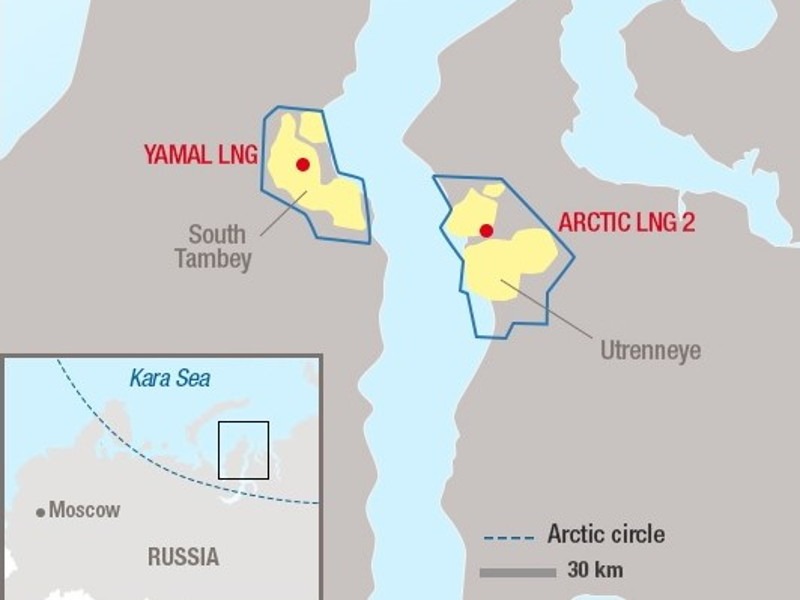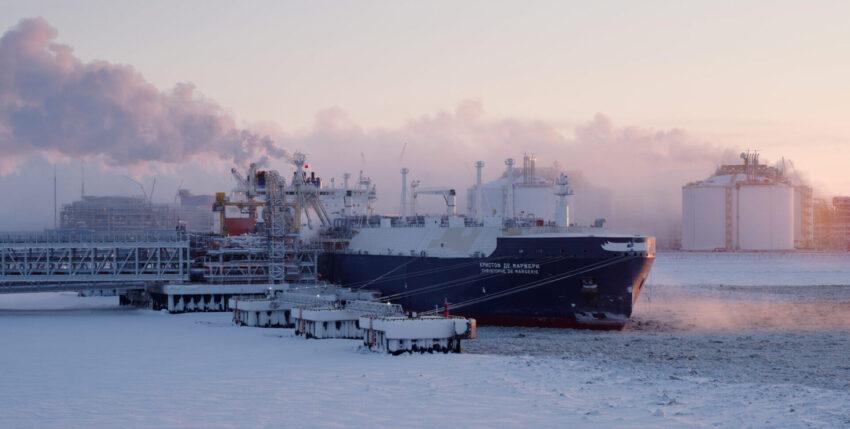Novatek, Russia's largest producer of liquefied natural gas (LNG), has completed the first line of its "Arctic LNG 2" project despite US and EU sanctions. The first LNG deliveries are scheduled to be shipped in the first quarter of 2024.
Profile
Arctic LNG 2 will have three production strings that can produce a total of 19.8 million tonnes per year. Each line will therefore have a capacity of 6.6 million tonnes. The other two production lines are expected to go into operation by 2026. Special feature: each production line will not be firmly founded in the permafrost, as is usually the case, but will be floating on gravity-based structures (GBS) in the Gulf of Ob.
Strategy
The "Arctic LNG 2" project is the second major project that Novatek is carrying out in the northern Siberian Arctic region on the Gydan Peninsula north of the Arctic Circle. This also includes the already completed "Yamal LNG" project on the opposite Yamal peninsula. Both projects are crucial to Russia's goal of more than tripling its LNG production to 100 million tonnes by the end of the decade.
Exports of Arctic LNG 2 could expand the overall supply and contribute to meeting the world's - and especially Europe's - energy needs, as Europe also continues to import significant quantities of Russian LNG.
Asia can be reached via the Northeast Passage in just 15 days, European harbours even faster. The icebreaking liquid gas tankers of the Christophe de Margerie class (15 units, 299 metres in length) were built for operation in Arctic conditions and can sail the Northeast Passage to the Bering Strait without icebreaker assistance.
With these Arctic production facilities, ice-breaking tankers and transhipment terminals, Russia aims to increase its LNG share of the global market from eight per cent to 20 per cent by 2035.

Owner
Novatek holds a 60 % stake in the operator of the Arctic facility. The French TotalEnergies SE, China National Petroleum Corporation (CNPC), China National Offshore Oil Corporation (CNOOC) and a Japanese consortium (Mitsui & Co. and Jogmec) each hold 10 % of the shares.
Sanctions regime
Western companies supplied important parts for Arctic LNG 2, but following Russia's war of aggression against Ukraine, sanctions imposed by the EU and the US in mid-2022 largely ended the collaboration. The USA has now imposed further sanctions against the Arctic LNG project. European and Asian customers are to be prevented from sourcing Russian gas from Siberia.
Contractor
As a result of the new sanctions, US supplier Baker Hughes only delivered four of the 20 planned gas turbines for the LNG plant. However, the Russian Nowatek Group found a replacement in China: the Harbin Guanghan Gas Turbine Company stepped in with a delivery. It remains to be seen whether their gas turbines are permanently suitable for the harsh conditions in the Arctic.
In December 2018, Novatek signed an agreement with the Italian company Nuovo Pignone for the supply of gas compressor turbines and gas turbine generators. The Italian company Saipem, which is building the German gas pipeline through the Pomeranian Bay in the Baltic Sea, also received an order to build the three floating gravity-based structures.
The German company Siemens Energy was commissioned by Novatek in February 2019 to supply compressor systems for the liquefaction plants.
Sanction evasion
And how could European companies continue to support the Russian Arctic LNG 2 project despite the sanctions imposed? The French Ministry of the Economy, which is responsible for enforcing the sanctions in France, explained that their application "depends on a case-by-case analysis". The sanctions are insufficiently monitored and enforced and there are differences in implementation in many European countries.
Federal Economics Minister Robert Habeck (Greens) finally wants to tackle this and is planning a series of measures to stop the circumvention of economic sanctions against Russia as far as possible. This is because it also involves large quantities of militarily usable components from the West. These usually reach other countries via intermediaries, who then send the goods on to Moscow. In addition, Russia conceals the origin of its own companies in order to be able to continue doing direct business with the West.
Source: gCaptain, NS Energy, Forbes, Handelsblatt







